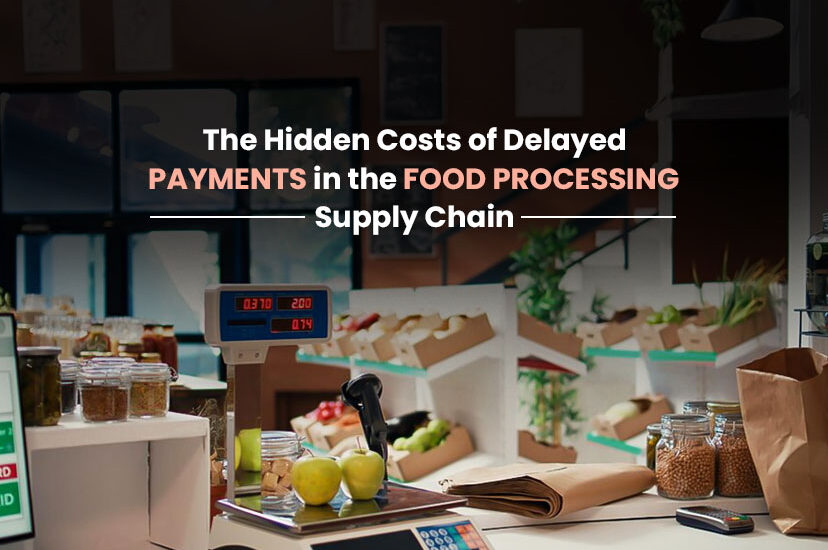- July 25, 2025
- Posted by: admin
- Categories: Early Payments, Supply chain financing, Blog

Food processing depends heavily on freshness, speed, and planning logistics; the supply chain has to run smoothly at all times. But a significant factor that slowly reduces your profits and workflow is delays in getting paid. Still, this cost can cause serious trouble for operations, erode collaboration with suppliers, and prevent the company from growing.
Why Timely Payments Matter in Food Processing
In this industry, transactions must be conducted promptly. Parts of the supply chain, such as sourcing raw materials and delivering goods, require the participation of several different people or groups. Any late payment can bring the entire production process to a halt, push back deliveries, and negatively impact a company’s reputation. The products used in food processing often perish much faster than those in other fields. Time plays a bigger role than money; it can determine whether the process yields profits or gives rise to waste.
Disrupting the Supply Chain Flow
Delays in payments have a major effect on the supply chain. Businesses use scheduled payments to monitor and manage their cash flow. If businesses engaged in food processing are late with their payments, their stakeholders could stop sending goods, postpone their work, or decide to walk away.
If suppliers fail to meet their deadlines, businesses face stock shortages and must either pay more for extra products or stop their production, both of which reduce profit.
Strained Supplier Relationships
Long-term supply relationships depend on having trust. If vendors always pay suppliers late, it can cause problems in their business relationships, mainly with small-scale farmers who may not be financially stable. Such suppliers could begin searching for buyers who have shorter payable times, which may cause processors to worry about both quality and reliability.
When things are tough for industries, it is almost impossible to remain faithful to one supplier, as the costs involved in switching can be high for both money and operations.
Higher Cost of Capital
People in the food processing industry often depend on short-term financing or credit when their payments are delayed. As a result, businesses may have to pay higher borrowing costs when interest rates are high. A short-term solution can turn into an expensive issue that adds more expense to your business.
Borrowing money excessively to cover shortages in working capital can increase the risk of getting trapped in debt for any company in a market with small profit margins.
Reduced Investment in Growth
As a result of delayed payment, there is often not enough money for improving product innovation or distribution channels. When businesses always aim to collect money, they cannot think ahead and miss out on new opportunities.
This stunted growth may not be clear in the beginning, but eventually, it harms the company’s position among competitors.
Damaged Reputation and Market Credibility
Supply chains are connected in which suppliers and providers talk, and words spread rapidly. Being known for late payments might stop a processor from securing good contracts later on. Because suppliers might see more risk in dealing with new vendors, they could demand a bigger upfront price, which drives up the company’s costs.
Damage to a company’s reputation, apart from disrupting work with suppliers, may affect the passengers using their services, those who invest in it, and the workforce, too.
Issues With The Handling Of Inventory And Storage
With late payments, businesses in the supply chain may stock up on materials to avoid delays in their operations. At the same time, this means stock or storage costs, screening problems, and at times, items spoiling. Making up for delays in payments often results in too much inventory, which becomes a problem for the company’s finances and logistics.
Storing perishable products in a warehouse for too long increases costs and leads to more wastage within the company.
Regulatory and Compliance Pressure
India’s MSMED Act requires buyers to settle their payments to suppliers within 45 days. Missing a payment may result in lawsuits and extra charges, increasing your expenses. Slow payments cause problems in working relationships and might attract the notice of regulators.
This point is even more significant when things must follow the law for government deals or export partners.
Export Challenges from Payment Lags
Late payments by food exporters can disturb the arrangement of international trade. Operating under strict deadlines is typical for most foreign buyers. When payments are not prompt, it can result in not receiving goods, being charged fines, and losing business agreements. When exchange rates and international regulations vary, it makes issues more difficult for exporters being paid late by clients.
The Role of Technology and Automation
Many companies are dealing with these issues by introducing invoice automation and supply chain financing systems. You can manage your invoices with these tools, set up reminders automatically, and allow your suppliers to get their payments right away. Being able to track payment cycles in real time helps businesses to plan their finances and avoid errors.
Yet, finding the right partner for financial services is equally important as picking the technology.
Solving the Problem of Payments
When payments are not made on time, the effect is significant and threatens the stability of the entire process of turning food into products. Some of the general results are extra fees on borrowing funds and a loss of trust from suppliers. This issue should be tackled by being organised, relying on strong financial systems, and communicating clearly with all sides. If a food processing company pays its suppliers more carefully, it can strengthen those relationships, enjoy better cash flow, and have greater profits.
For businesses dealing with global sales, Credlix ensures there are no trouble spots in managing cash flow. Businesses can easily obtain financing against unpaid invoices using only their invoices for collateral. With our custom export financing, both domestic and international sellers can operate smoothly, remain compliant, and expand. When you choose Credlix, you do not need to worry about seasonality in payments.